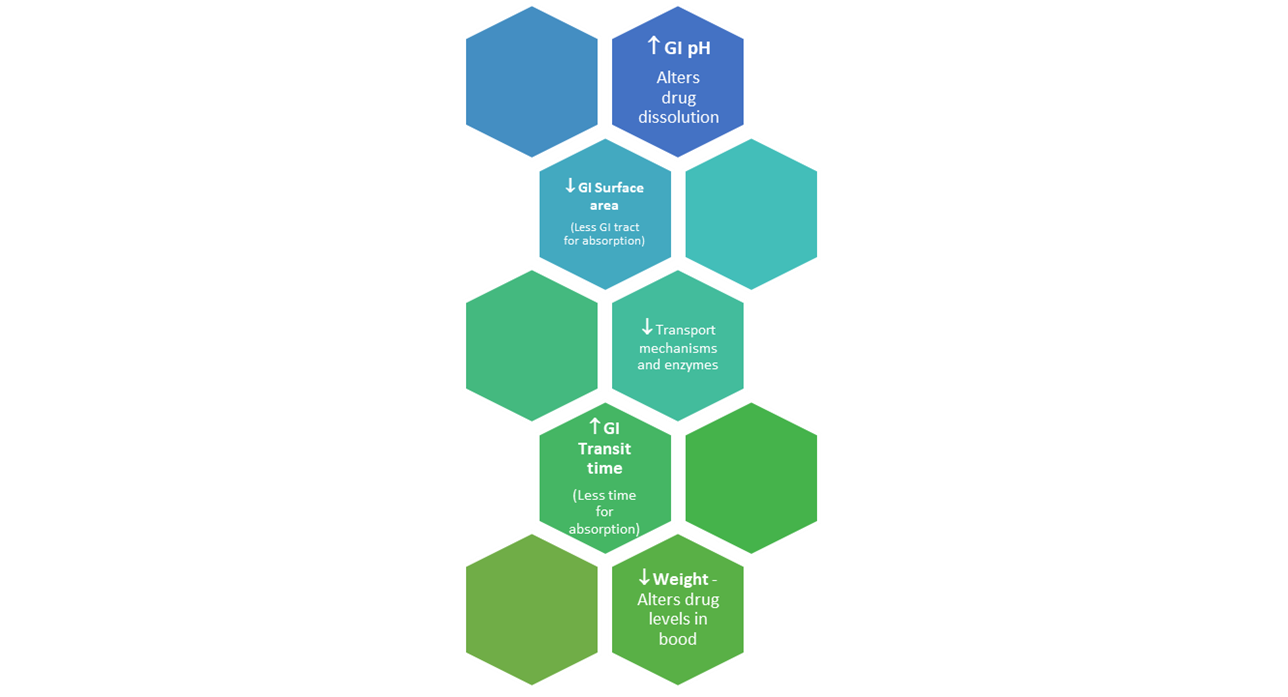Factors That Alter Drug Absorption
How you dissolve, absorb and process oral medications — those taken by mouth — changes after a total gastrectomy. Bypassing the stomach and upper part of the small intestine reduces the time and surface area needed for drug absorption. There are some unique proteins and enzymes involved in drug absorption and metabolism (breakdown) in these parts of your digestive tract. Without these, the absorption of certain medications can either be enhanced or decreased, depending on the characteristics of that medication.
You and your care team should carefully consider each medication and its use after total gastrectomy. Contact your clinical pharmacist or care team if you have any questions.
After gastrectomy you have:
- A higher gastrointestinal (GI) pH, which may alter how drugs dissolve
- A smaller GI surface area, which means less opportunity for medications to be absorbed into your body
- Fewer transport mechanisms and enzymes to digest medications
- Faster GI transit time, and therefore less time to absorb medications
- Likely weight loss, which alters drug concentration levels in your bloodstream
Here are some general recommendations to follow after total gastrectomy:
- Review your medication history with a clinical pharmacist and/or your care team
- You and your team may consider alternate forms of medications, such as transdermal (through the skin), sublingual (under the tongue) or intranasal (through the nose), when there are concerns with oral absorption
- You may be able to crush some medications or open capsules to help them dissolve and help your body absorb them better
- Always check with your pharmacist or care team before crushing or opening any medications
- Liquid medications may contain artificial sugar, which may increase the risk of dumping syndrome
- Discuss these medications with your pharmacist or dietitian before taking them
And try to avoid:
- Timed or controlled-release medications, including those labeled ER, XR or CR
- Medications that cause gastrointestinal irritation or require a highly acidic environment for optimal absorption
Pain Medications After Your Gastrectomy
- Your pain management medications after surgery may come in multiple forms, including epidurals, intravenous and oral medications.
- Short-term use of oral opioids may be used as prescribed by a doctor for pain as needed.
- Because there is a possibility of increased absorption of oral opioids after total gastrectomy, be sure to receive the lowest effective dose possible.
- Immediate-release acetaminophen tablets may be used as needed.
- Moderate amounts of Non-Steroidal Anti-Inflammatory Drugs (NSAIDs), such as ibuprofen and naproxen, may be used if needed for short periods.
Other Specific Types of Medications to be Aware of
Remember to discuss any medications you may take with your pharmacist and/or other members of your care team.
Antibiotics
- You may require longer courses or higher doses of antibiotics for optimal absorption and treatment of bacterial infections.
- Your physician may use antimicrobial sensitivity tests to choose the most effective antibiotic for you.
Contraception
- After a total gastrectomy, you will want to avoid oral contraceptives (“the pill”) containing estrogens or progesterone due to decreased absorption (and therefore decreased efficacy).
- Discuss alternative forms of contraception, such as intrauterine or implantable devices, with your care team and/or OB-GYN before gastrectomy.
Medications for bile reflux
Bile reflux occurs when digestive liquid produced in your liver backs up into the esophagus. Bile reflux can occur after total gastrectomy. Refer to “Diet and Nutrition After Gastrectomy: What You Should Know” for more information about how to avoid bile reflux.
- Bile reflux is not the same as acid reflux.
- Therefore, you should avoid typical drugs used to treat acid reflux, such as proton pump inhibitors (e.g., Omeprazole, pantoprazole) and Histamine2 blockers (e.g., Famotidine).
- Your treatment for bile reflux may include lifestyle and diet changes as well as medications such as sucralfate.
- If lifestyle and physical remedies do not help your bile reflux, talk to your dietitian or health care team for more information about possible alternative medications.
Chronic Medications
- Your weight is expected to rapidly drop after total gastrectomy and reach a new stable baseline between 6 and 12 months after surgery.
- Some medications, such as those used to treat hypertension and diabetes, are dosed based on weight and will likely require dose adjustments based on your new baseline weight.
- Close follow-up with a primary care physician is crucial during this period.
- You should review your medication list with your gastrectomy care team and clinical pharmacist prior to surgery and in any follow-up appointments.
